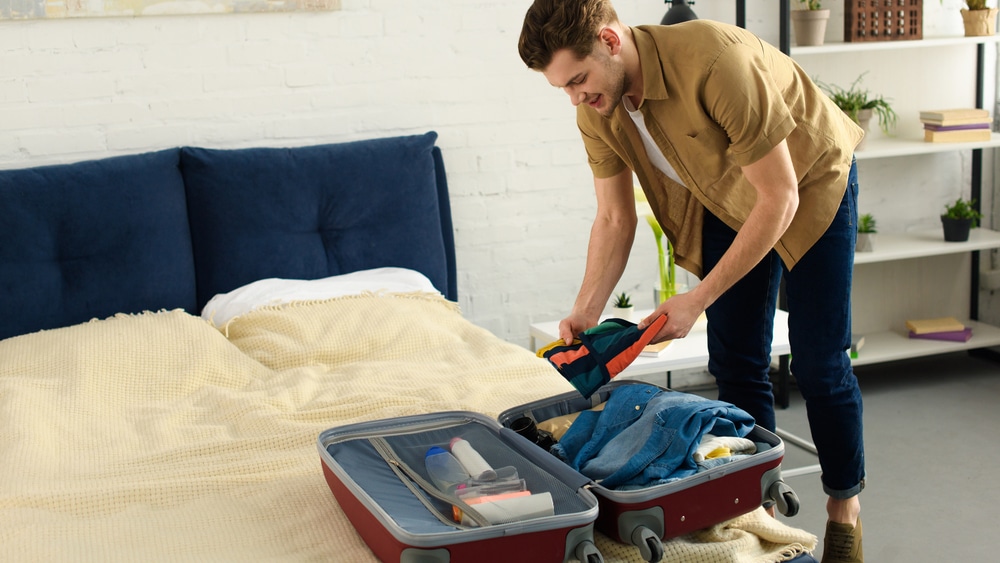
So, the decision has been made to finally follow through on that promise to get help with addiction. The first step can be checked off the list and now it’s time to get rehab ready. Next, it’s helpful to emotionally and physically prepare for the transformation that’s necessary for recovery. One thing that many addicts don’t consider, is the amount of spare time that will be available, once living sober. Filling it with quality coping tools will be important, both physically and emotionally.
Without a schedule filled with drug-seeking behavior, there will be room for new adventures and experiences. Going to rehab is an opportunity to purge the negativity out and become a better, more whole individual. Even better, now there will be time to really live a life and have experiences that make it worth living.
But first, the work has to be done to get to this place of freedom. Breaking the cycle of addiction isn’t always easy, in fact, at times it feels impossible. Rehab guides individuals through addiction treatment, toward the development of rewarding behaviors that will certainly pay off in the long run. Knowing that it is worth it and being prepared when going to rehab, gets everything started on the right foot.
Focusing On The Important Things When Getting Rehab Ready
Everybody is different, as a result, certain things mean more to some than others, when preparing to make real change. But how do you even prepare for something like going to rehab?
Some of the most common concerns are often the most simple, but they can cause a great deal of stress. So stressful, that it can even deter an addict from getting the treatment that they desperately need. But the uncertainty when going to rehab is normal, and almost everyone thinks this way at least once.
“What will we eat? What should I wear? Is there anything I need to bring? What if I forget something? What if I can’t do it? How do I know if I’m doing the right thing? What will my friends think?…”
Unanswered questions like these can quickly trigger rehab-ready individuals, causing them to spiral off course. However, rest assured, no one is alone, and no one has to be. Rehab programs are designed to teach effective ways to handle the uncertainty of situations like this. But to get out ahead of it, there are some tips and techniques to make the transition flow more easily.
Rehab Ready Mindset
Getting sober means having to make some changes. Physically speaking, the major change will be navigating through each day without using substances. But, in order to make sobriety a daily part of life, recovery starts by adopting a new state of mind. Before going to rehab, many addicts don’t realize the harmful effects of their negative mindset but it does matter. Here are a few things to work on that help to be rehab-ready.
Approach treatment with an open mind.
Let go of what you “think” rehab is going to be like and experience it for yourself first hand. Remember why going to rehab was necessary in the first place. Develop your own opinions instead of relying on the hearsay of others. Especially those who have voiced their thoughts about going to rehab, having never completed the program themselves.
Most of all, before deciding that it is too hard or not worth it, see it through until the end. So many individuals are surprised to find when looking back, that rehab could have been so rewarding an experience.
Give those who are trying to help, a chance to do so.
Realistically, it’s not uncommon to be hesitant toward people who are trying to help you change, even if it’s for the better. Do your best to give yourself, the people around you, and the initial experience a chance. The truth is, you don’t have to like everyone. But do respect what they are trying to do for you. Meeting with therapists and counselors is a big part of going to rehab, and these professionals want you to succeed.
Know that some days will be tougher than others.
Some days are better than others, that’s just the way life works, rehab or not. But while it’s important to keep a sense of that reality, it’s worth mentioning that not every day will be hard. In fact, most of the time, rehab makes people feel safe and welcomed, as part of a new community. Supporting each other through group therapy and interactive lessons builds friendships and relationships that are relevant, with relatable interests.
Get honest; stay honest.
No matter how ashamed a person may feel, rehab is a safe place to be open about it. Doing so is part of healing and learning how to keep moving forward. Going to rehab and facing addiction head-on is a vulnerable experience. When getting rehab ready it’s helpful to accept that time invested in individual therapy enhances the treatment approach. Instead of preparing to hold back thoughts and feelings, get real during therapy, especially with yourself.
Often, recovering individuals have experienced trauma that has not yet been addressed, and ignoring them can be harmful. Denial is a behavior of addiction. Addictive behaviors trigger a relapse. Accept that addiction is an illness and that it’s bigger than you; Then, accept the help that is offered.
Work on getting better rest.
Sleep is essential to our overall health and well-being. Drugs and alcohol interrupt the body’s naturally occurring circadian rhythm. Thereby, they interfere with quality sleep and elevate stress. While getting rehab ready, during treatment, and even after going to rehab, a regular sleeping schedule is beyond beneficial. Honestly, it can take some time to adjust but it’s worth getting into a routine. Regular routine behaviors are a big part of recovery, and quality sleep and rest are the foundation.
Healing relationships adds to support systems.
It’s essential to develop a strong support system to rely on when treatment is completed. However, when initially going to rehab, some relationships, especially family connections, may have sustained significant damage. This can be a stressful situation while getting rehab ready but some relationships simply need more time.
Family therapy is a program designed to make amends with estranged loved ones that have been hurt by addiction. Working to communicate through accountability and forgiveness, is done in a safe space, guided by a therapist or professional. For sobriety, it’s beneficial to associate with positive people who provide the support needed to continue long-term recovery efforts.
Detoxing at rehab means receiving professional help to get through it.
The most intimidating part about going to rehab is, hands-down, going through detox. To be fair, it’s not considered enjoyable. However, it isn’t always torture either. Detoxing at home without professional oversight is more uncomfortable and even dangerous. To be safe, get medical intervention and avoid any unnecessary suffering. Detoxing in a professional facilities allows for therapies like MAT to make it more tolerable. MAT stands for medication-assisted therapy, and for those that qualify, can be used to get through the worst of it.
Trust the process, even if you have doubts.
Everyone has doubts at some point, this is normal when going to rehab. But remember, going to rehab works, and it has helped millions before. Humility is an important teacher. Listen to those that have walked this path before. Trust that they are there to offer guidance through the process and that they are there to benefit from. They may become an important resource for relapse prevention methods, based on experience.
Questions are made to be asked, so ask.
Knowledge is power. Never be ashamed or embarrassed to ask questions until fully understanding the recovery process. Not everyone going to rehab has been there before or has a perfect understanding of what is expected of them. It’s important to comprehend each step, to get the most out of the program. Besides, that’s what experienced professionals are there for, and learning is the purpose of being there, to begin with.
Feelings are okay to feel, so feel them.
It’s okay to feel. Actually, it’s encouraged. But just remember to learn from them too, everyone going to rehab is going for essentially the same reason, and everyone has emotions going along with them. Learning how to cope with feelings healthily and soberly is what going to rehab is all about. Opening up allows for certain treatments, like cognitive behavioral therapy, to break associations between emotions and addiction. Addiction is largely driven by feelings, but then again, so is choosing recovery.
Negativity is contagious and addictive; it’s best to steer clear.
When going to rehab, leave any unnecessary worries out of it for now and instead focus on the present. Memories, although great to learn from, tend to be negative when associated with substance abuse. Stay away from the anger. Put distance between negative people. This includes others that may be going to rehab also or those already there. Not everyone who’s rehab ready is participating willingly. Although the outlook will eventually get better given time and sobriety, anger and negativity can both breed addiction.
Be patient, but also aware.
Be patient. Rehab is not a sprint. It will take time to get adjusted, and that is okay. Stay conscious of the things that work, and those that don’t. There is a process in place for a reason and it works. Trust it, until you can trust in yourself.
Be positive and celebrate success.
Be sure to celebrate milestones, no matter how big or small. Getting through one week sober is a big deal. Small steps lead to big steps that eventually turn into lifestyle changes. Honor each achievement, even if it’s done so quietly. Do your best not to compare accomplishments to anyone else’s, and to build each other up whenever possible. You never know what another person is dealing with inside and a little encouragement goes a long way.
Things To Bring When Going To Rehab
Realistically, when going to rehab, all you really need to do is show up and do the work. But for some people, bringing certain things along can add to the experience, or make it more comfortable. However, it may depend on the treatment program and what is allowed within the facilities. Especially when participating in a residential rehab treatment program, some things from home could make the transition easier.
Pictures or mementos can help to stay motivated
A few mementos or things that provide inspiration to complete the work are allowed on campus. There may be times when feeling down is unavoidable, especially in the beginning. Photos of the family, loved ones, children, or even pets can boost morale and help maintain perspective on what’s important.
A journal or notebook to write down thoughts or lessons
Sometimes journaling or writing down thoughts can help to manage emotions. The process of treatment can sometimes cause feelings to peak and memories to flood back in. Writing them down is therapeutic in itself, and serves as a reminder to with through in therapy or group sessions.
Sneakers and athletic clothes may be necessary
Exercise has been proven to help ease anxiety and depression, which can sometimes linger after substance abuse. During downtime, the worst thing to do is to be stagnant. Getting the body moving helps to gain physical and emotional benefits, and will add value to recovery routines.
A sweater or pillow makes the experience more comfortable
During drug and alcohol detox, the body is going through a lot and can sometimes have difficulty regulating temperature. Comfortable clothes, a sweatshirt, or even a pillow can help until the vulnerable times pass. Again, detox does not last forever, but needs to be completed, before healing and recovery can begin.
Toothbrush and toiletries
Although it may not seem important right now, when a person begins feeling better, they often want to look better. When working through treatment, developing confidence and self-worth comes along with it. Besides, sometimes, looking better is an instant mood enhancer on even the toughest days.
What Not To Pack When Going To Rehab
While the list of what can be brought along when going to rehab is quite long, there are exceptions. Many of these items are obviously not allowed, and some need to be cleared before being brought on campus. The non-negotiable items that need to be left behind when getting rehab ready are as follows.
- There’s a zero-tolerance policy for drugs, alcohol, or paraphilia. This includes products that contain alcohol, like mouthwash or perfume. The rules also extend to aerosol cans and sewing kits.
- One week’s worth of clothing. Typically, washers and dryers will be made available, so overpacking is not necessary.
- Weapons of any kind are prohibited on campus.
- Excessive jewelry and valuables should be left behind where they are safe.
Going to rehab can be stressful and it may take some getting used to. But each restriction is put in place to ensure the safety of each resident. While some items may not seem directly threatening, triggers for each person will be different. Best to follow the rules and focus on learning how to be sober.
Authorization May Be Required For Some Items Before Going To Rehab
Even those attending an outpatient treatment program need to be rehab-ready. Because residing within the facilities is not necessary for each person, precautions must be taken to avoid contraband. Some items, like prescription medications or nicotine for vaping devices, must be regulated and closely monitored. Each facilities has its own policy, and it helps to become familiar with what is acceptable and permitted on-site.
Going to Rehab, and After
Rehab offers addicts an opportunity to take back control of their lives. Going to rehab can offer each individual the necessary information to get and stay sober. Yet, despite rehab being a valuable stepping stone towards sober living, it is a temporary step. Upon going to rehab and throughout the program, it’s crucial to learn how to create your own emotional safe space. Even while residing in sober communities, it is up to the individual to do the work to remain in recovery.
Going to Rehab Long-Term
Although many addicts are anxious about going to rehab, many decide to stay beyond the course of traditional treatment. This can be determined on a case-by-case basis and is not necessarily a requirement. The truth is, for so many individuals, rehab has been life-saving.
Long-term residential rehab is an option for addicts that have a difficult time staying sober or are high-risk for relapse. These programs allow for a gradual transition into lower levels of care, without an abrupt end. Moving too quickly into real-world situations can be startling, or even triggering, without the safety net of therapy. Comfortable progression of long-term rehab offers a solution.
Rehab For Dual Diagnosis
Many individuals struggling with substance abuse, may unknowingly face mental health issues that have gone undiagnosed. This is referred to as a dual diagnosis. Treating mental illnesses and addiction together is an essential part of being able to maintain recovery.
Psychological illnesses that are left unmonitored can result in relapse or worsened mental and emotional state. Going to rehab ensures that the individual is treated as a whole, and able to maintain wellness moving forward. Dual diagnosis will be evaluated for and treated professionally, as a standard part of addiction programs.
Get Ready to Go to Rehab And Get Help Getting Sober
Breaking the cycle of addiction isn’t easy. But getting rehab ready can be. Adjusting to a new way of life makes living without substance worth it. The new experiences and fresh outlook that come with sobriety are worth going to rehab and doing the work.
Being rehab-ready doesn’t mean that being scared or anxious isn’t allowed. But it does mean that you are willing to put those feelings aside to get help. Reach out to get more information on going to rehab. Find out what you should expect, and what you need to bring. Getting sober means having to make some changes, and rehab can show you how.






